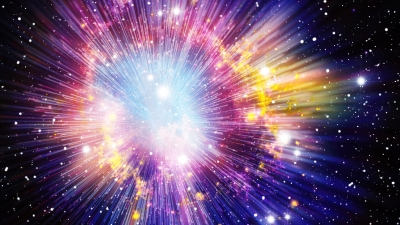
The theory of a Hot Big Bang is the most widely accepted hypothesis for the origin of the universe, but it still leaves many questions unanswered.
Since the early part of the 1900s, one explanation of the origin and fate of the universe, the Big Bang theory, has dominated the discussion. Proponents of the Big Bang maintain that, between 13 billion and 15 billion years ago, all the matter and energy in the known cosmos was crammed into a tiny, compact point. In fact, according to this theory, matter and energy back then were the same thing, and it was impossible to distinguish one from the other.
Adherents of the Big Bang believe that this small but incredibly dense point of primitive matter/energy exploded. Within seconds the fireball ejected matter/energy at velocities approaching the speed of light. At some later time—maybe seconds later, maybe years later—energy and matter began to split apart and become separate entities. All of the different elements in the universe today developed from what spewed out of this original explosion.
Big Bang theorists claim that all of the galaxies, stars, and planets still retain the explosive motion of the moment of creation and are moving away from each other at great speed. This supposition came from an unusual finding about our neighboring galaxies. In 1929 astronomer Edwin Hubble, working at the Mount Wilson Observatory in California, announced that all of the galaxies he had observed were receding from us, and from each other, at speeds of up to several thousand miles per second.
Picture Credit : Google




